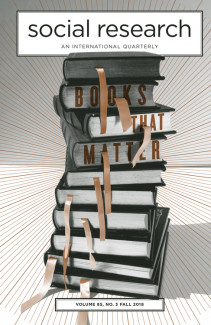
Johns Hopkins UniversityEst. 1876
America’s First Research University
American Cons and Scams

In April 2018, Social Research held its 37th Conference at The New School. a collaboration with the Society of Fellows and the Heyman Center for the Humanities at Columbia University, the conference examined "Cons and Scams: Their Place in American Culture."
Like other conferences hosted by the journal, the presenters also wrote a paper for a special issue of the journal, which was published as the Winter 2018 issue. Editor Arien Mack said this topic - which has a rich history - fit seamlessly into the time because "this is perhaps the first time we have had a US president whom some have called a con artist."
Mack joined us for a Q&A about the issue.

The way all Social Research issues and conferences come about - I or myself in conversation, often accidental, with others come up with the subject. This one was a natural given our current President. It also brought to mind a book by Richard Hostadter, The Paranoid Style In American Politics. After thinking about it and talking with a few people, i was convinced that it was a possible subject for a conference and issue.
What is it like taking an idea from a conference to a journal issue?
It's quite a lot of work. I normally spend a fair amount of time on Google searching for possible speakers/authors, and we normally talk about it at one editorial board meeting. Once the agenda for the conference is figured out and speakers identified, they are invited to present. We let them know that we will expect a paper based on their conference presentation for the special issue of Social Research. Almost all of the 38 conferences we have done are also issues of the journal.
Is there any difficulty in a project like this when the news changes so quickly?
This has never been a problem since the topics we choose for issues and conferences are not ephemeral. Certainly the role of cons and scams in American life and political life has a history and undoubtedly will have a future.
How difficult is it to square the historical representation of the con man as a romantic figure in entertainment and the current concerns about real-life con men damaging the lives of others?
Even the romantic figure of a con man did damage, it was just local damage, so not a difficult transition.
What new perspectives did you find when putting the issue together?
I think the thing that I was brought home to me in putting together this conference was how prevalent con men were whether in political life or almost all other aspects of life. There is a great deal written about all aspects of conning.


